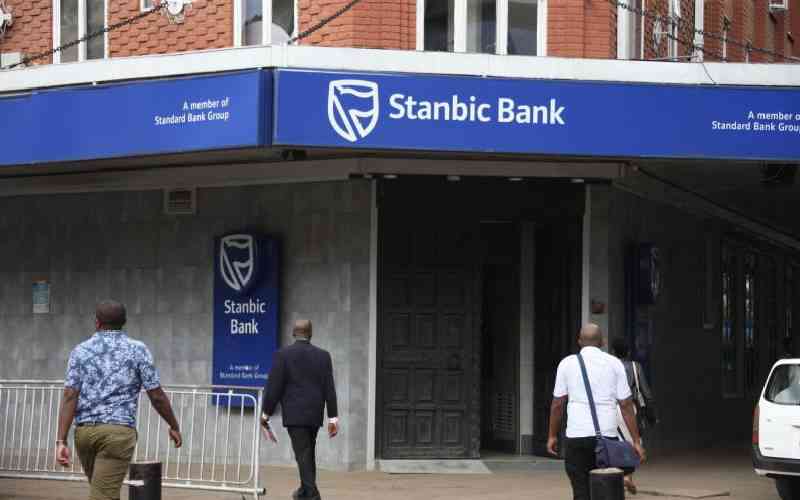
An arrest warrant issued for a top executive of Stanbic Bank has brought attention to a high-stakes financial dispute between the bank and South Sudan’s aviation sector. The conflict stems from a series of alleged unauthorized financial transactions involving Air Afrik Aviation Limited, a South Sudanese airline, and has significant implications for international banking practices and corporate accountability.
Background of the Dispute
The controversy dates back to February 5, 2016, when Stanbic Bank, a subsidiary of Standard Bank Group, received a credit note from the Bank of South Sudan (BoSS) indicating a deposit of $7.22 million into Air Afrik’s account. Acting on this note, Stanbic credited the airline’s account with the stated amount. However, shortly after, the bank reversed the transaction, claiming that the funds were not physically transferred from the central bank.
Stanbic also froze Air Afrik’s account to prevent further withdrawals, sparking a legal battle over the reversal’s legitimacy. According to Eric Lugalia, Managing Director of Air Afrik, the reversal caused irreparable damage to the airline’s operations, leading to the termination of a $20 million plane leasing contract with the South Sudanese government.
Air Afrik alleges that the reversal was unauthorized and accuses Stanbic of misconduct. The airline is now pursuing damages for the financial losses incurred during the fallout.
Issuance of Arrest Warrant
On January 7, 2025, South Sudan’s Public Prosecution Attorney issued an international arrest warrant for Fredrick Owuor Ouko, Stanbic Bank’s head of operations in South Sudan. The warrant accuses Mr. Ouko of financial impropriety in handling the funds and failing to adhere to proper banking procedures.
South Sudanese authorities argue that the warrant is part of their efforts to ensure corporate accountability and transparency in financial dealings. They accuse Stanbic Bank of exploiting legal loopholes to avoid liability for the losses suffered by Air Afrik.
The arrest warrant has intensified tensions between Stanbic Bank and South Sudanese officials, with the bank accusing authorities of harassment and intimidation.
Stanbic Bank’s Response
Stanbic Bank has publicly disputed the allegations, questioning the legitimacy of the arrest warrant and the timing of the legal action. The bank insists that the funds credited to Air Afrik’s account were reversed due to the lack of corresponding deposits from the Bank of South Sudan.
In a statement, Stanbic Bank noted that similar claims were investigated by the Central Bank of Kenya in 2016, which found no wrongdoing. The bank views the current legal actions as repetitive and unnecessary, arguing that they undermine its efforts to foster stable banking operations in the region.
Stanbic also emphasized its commitment to ethical practices, claiming that the reversal was consistent with international banking standards.
Checkout: Starlink Faces Increased License Fees Under New Kenyan Regulations

Legal Implications and Challenges
The case underscores the complexities of cross-border banking operations, particularly in regions with evolving legal and regulatory frameworks. It highlights the challenges financial institutions face when managing disputes in jurisdictions where legal protections and banking oversight may differ significantly from global norms.
For Air Afrik, the alleged financial misconduct has created operational challenges that have had ripple effects across South Sudan’s aviation industry. As one of the country’s primary airlines, Air Afrik’s struggles impact government contracts, local businesses, and broader economic stability.
On the other hand, Stanbic Bank’s reputation is at stake. Allegations of financial mismanagement and failure to uphold fiduciary responsibilities could damage its standing in South Sudan and other markets.
Broader Impact on the Banking Sector
This high-profile dispute sheds light on the risks financial institutions face when operating in volatile or underdeveloped markets. It raises questions about due diligence, transparency, and the mechanisms banks use to ensure compliance with both local and international laws.
The case also serves as a warning to businesses about the importance of establishing clear, enforceable agreements in financial transactions. Missteps can lead to costly legal battles and damage to corporate reputations.
Stanbic Regional Challenges
Stanbic Bank has faced scrutiny in other jurisdictions as well. Recently, its CEO, Joshua Oigara, was summoned by South Sudan’s Public Prosecution Attorney to address allegations linked to the same dispute. In Kenya, Mr. Oigara and other senior officials secured court orders to block summonses from the Banking Fraud Investigations Unit.
These developments point to broader challenges faced by Stanbic Bank in managing its regional operations. While the bank is a significant player in Africa’s banking sector, disputes like these risk eroding trust and stability in its cross-border dealings.
The Path Forward For Stanbic Bank
For Stanbic Bank and Air Afrik, resolving this dispute will require transparent legal proceedings and constructive dialogue. Both parties must prioritize accountability and fairness to restore trust in their operations and relationships.
South Sudan’s authorities must also ensure that their actions align with international legal standards to avoid perceptions of bias or harassment. As a developing economy, the country’s ability to attract foreign investment depends on fostering a predictable and transparent business environment.
Meanwhile, Stanbic Bank must address the allegations with urgency and transparency. Demonstrating a commitment to ethical practices and corporate responsibility is essential to preserving its reputation and maintaining client confidence.
The arrest warrant for Stanbic Bank’s executive marks a significant escalation in the dispute over South Sudan’s airline funds. As the case unfolds, it highlights the complexities of cross-border financial transactions and the importance of maintaining transparency and accountability in international banking.
The outcome of this legal battle will not only impact Stanbic Bank and Air Afrik but could also shape the future of corporate governance and financial regulation in the region.





